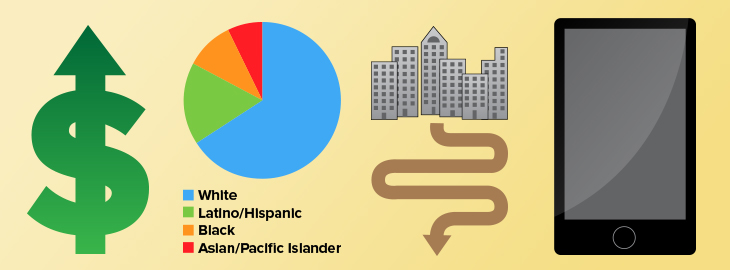
4 Trends of the Millennial Home Buyer
Posted On November 10, 2016
(Today’s post courtesy of Zillow.com who offered to share some of their home buying trends research.)
By Jennifer Riner
Young, urban professionals have a reputation for renting in the city. While this holds true for many, you might be surprised to learn that half of the current home buying market is under 36-years-old. Millennial home buyers between 18- to 34-years-old currently make up the biggest piece of the residential real estate pie at 42 percent.
In the newly released Zillow Group Report on Consumer Housing Trends, the real estate experts and economists dove into the demographics of home buyers. Here’s four trends they found among millennials.
- They Lease Longer and Buy More
Zillow’s study, which analyzed 13,000 homeowners, buyers and sellers, shows that two-thirds of millennial home buyers consider renting as they go through the house-hunting process. One in three of these buyers seriously consider leasing instead of buying. Although millennials tend to rent longer than prior generations, young buyers make loftier home purchases when they eventually settle. Rather than opt for the traditional starter home, millennials spend a median $217,000 for a home. This price point is actually higher than that of Baby Boomers and just 11 percent less than what Generation X spends. Despite an assumed financial gap between younger and older generations, the median millennial home is a similar 1,800 square feet. However, almost a third of all buyers across age groups end up overspending compared to their initial budgets.
- They Are Diverse
Of all millennial homeowners, 66 percent are white, 17 percent are Latino or Hispanic, 10 percent are black and 7 percent are Asian or Pacific Islander. Within all homeowners across generations, diversity isn’t as prominent. Seventy-seven percent of all homeowners are white, 9 percent are Latino or Hispanic, 9 percent are black and 5 percent are Asian or Pacific Islander.
- Most Stick to the Suburbs, with a Caveat
Despite reports of millennials gravitating toward large cities for job opportunities, nearly half of millennial home buyers choose to live in the suburbs. Meanwhile, just 25 percent of millennial homeowners reside in the urban core. These suburban tendencies among young buyers show a greater admiration for the traditional American Dream than one might expect. However, the drive for communal conveniences is alive within millennial home buyers, with 54 percent purchasing a home with shared amenities. Such features are typically found in newer complexes as well as developing neighborhoods.
- Technology Is a Must
Given today’s technological landscape and quick-to-adopt Generation Y, millennials take the online shopping process seriously. Unlike their predecessors, nine out of 10 young buyers implement online resources for home buying education. Eight out of 10 turn to mobile devices to assist them through the various stages of home buying. One in four use at least five online resources, while over two-thirds use affordability tools to weigh their mortgage options. But, online research paves the way for networking. Millennials reach out to more real estate agents than any other generation, contacting at least two when buying and three when selling. More than 60 percent read online reviews before settling on their agent of choice. When it comes to communication, however, most millennials (30 percent) prefer to talk to their agent on the phone while 24 percent prefer to meet in person, mimicking a Baby Boomer-like method. Interestingly, despite the popularity of written communication, less than one in six millennials opts to text with an agent.
Although millennials represent a new wave of home buying trends, many of the dissimilarities between generations are subtle. In fact, most Generation Y buyers share the same sentiments of other generations that a home purchase is a great investment. And, the influence and expertise of the real estate agent hasn’t been lost on young home buyers, proving that technology hasn’t replaced the need for dedicated professionals. The majority of millennials enlist the help of an agent and are actually more likely to stay in touch and submit referrals than any other age group.